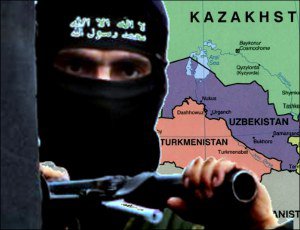Several weeks ago ISIS (also known as ISIL and Islamic State) forces reached Turkey’s borders, destroying all ‘infidels’ in their path, by which they mean both Christians and Muslims belonging to other branches of Islam. Support for ISIS has also extended beyond its region: Afghan and Pakistani members of the Taliban have already begun to swear allegiance to this new radical Islamist movement.
Recently, representatives of ISIS have stated that one of the organisation’s tasks is to destabilise the situation in Muslim countries in Central Asia, as well as in Russia. Meanwhile, repeated reports have surfaced about citizens of former Soviet republics engaged in combat alongside ISIS fighters.
Specialists in politics and international relations, regional specialists, politicians and informed observers were asked what they think about the subject. The following questions were put to them:
- How real are ISIS’s threats to destabilise the situation in Central Asia and Russia?
- How real is the possibility of ISIS recruiting Muslim citizens from Central Asia and Russia?
- If these threats are a reality, are Central Asian countries capable of independently tackling this threat or do they need help? If the latter, then from where – Russia, the US or other countries? What might Russia and the US demand in exchange for their help?
- Given the threat of ISIS, if this movement can be considered a threat, is Russia prepared to cooperate with the US in destroying ISIS to the extent of engaging their armed forces? If not, how are they prepared to help?

Aleksei Malashenko chairman of the ‘Religion, Society and Security’ programme in the Carnegie Moscow Centre, co-chair of the ‘Interethnic relations in Russia and the CIS’ programme, and one of the leading Russian specialists on Islam.
I don’t think ISIS will drastically affect the situation in the Central Asian countries, and especially in Russia. They don’t have the guts for it. This movement has already compromised itself by chopping off people’s heads: the media are full of reports of executions. And members of both government and the opposition in the countries of Central Asia are of course distancing themselves from this movement; their position is roughly: ‘we are not the Middle East and it won’t happen here.’ But in terms of influencing the domestic situation or provoking some public reaction or social movement, it is possible.
With regards to ISIS recruiting Muslims, I think this issue is being exaggerated. We have no clue how many fighters from Central Asia and Russia are there at the moment: I don’t think there are many. In any case, there are no ‘Uzbek battalions’ there. We knew that fighters from Russia – from Makhachkala (Dagestan) and Tatarstan – took part in the Syrian war. But the exact number is, again, unknown. We might be talking about dozens, but definitely not thousands.
Russia has already taken a de facto part in the war against ISIS.
Russia has already taken a de facto part in the war against ISIS, by sending billions of dollars’ worth of supplies to the movement’s opponents. There are also Russian advisers in the Middle East. But it is difficult to say how the situation will develop. It’s a long term development. We are a part of the Islamic world and, of course, we will take part in all these processes.
If we are actually talking about the Central Asian countries, then I don’t think that they seriously need to be worried about ISIS. That’s not what we need to think about or fear. They have enough internal problems of their own, which need resolving: the transition of power and cross-border, economic and political issues.’
* * *

Stanislav Belkovsky, political scientist and commentator, former director of Russia’s National Strategy Institute.
All the threats from ISIS are quite real. It’s already clear that the movement can boast of military success. But authoritarian regimes of the kind that exist in Russia and in the countries of Central Asia, are, in fact, fruit that can fall into carefully outstretched hands. It only requires the right conditions.
The recruitment of young people to join the ISIS fighters is also quite real, all the more so in an atmosphere of unemployment in the Central Asian countries and the Muslim republics of the Russian Caucasus.
In an atmosphere of unemployment in Central Asia and the Caucasus, ISIS recruitment of young Muslims is quite real.
The Central Asian countries will not be able to counter ISIS threats by themselves. Their armies are not capable of resisting experienced militants. They don’t have the military capabilities or indeed the national unity necessary for a war, and so they will ask for help from everyone and anyone possible, and in the first place from Russia and the US.
On the other hand, Vladimir Putin wants to sell the services of Russia to the US to help destroy ISIS. But his ‘sale’ is conditional on the removal of international sanctions against Russia and a pledge of non-interference in Russian policies in the post-Soviet space, and also on a change of the US’s position on the Russian-Ukrainian crisis. But the US is not ready to go there. Clearly, they don’t think this exchange is fair.
* * *
Yadgor Norbutaev, military specialist, blogger, international observer at Fergana.ru.
First of all, it should be noted that the danger lies less in ISIS as a state or a military force, than in the ideology advocated by its followers. This ideology is spreading like a dangerous virus, and people have not yet fully understood the extent of the threat it presents. In other words, the symptoms of the illness are known but nobody knows how to fight it. They’re trying to cure it with occasional ‘poultices’ (bombing attacks), but evidently without any real faith in a full recovery.
ISIS ideology (the virus), like any disease, mainly strikes ‘weak’ governments (organisms): economically underdeveloped, poverty-stricken places where the population is oppressed by their own governments, and so on. Note that it is mainly Muslim countries or countries with large Muslim enclaves that are susceptible to this disease. ISIS cannot threaten Japan, for example, and other countries with controlled immigration of migrant workers, immigrants, refugees etc, are also under less of a threat.
As with any ideology, ISIS’ principles are typically spread independent of the geographical position of the object of conquest.
One more characteristic trait is that it is already clear that ISIS will, in the near future, base its campaign less on its armed forces than on more unconventional methods of warfare, so that national frontiers alone will not be able to stop them. Their emissaries will penetrate Muslim countries like rats carrying plagues across continents.
It follows that Central Asian governments to a larger extent, and some republics of the Russian Federation to a lesser, are tempting ‘honeypots’ to followers of ISIS ideology. And I consider it erroneous to claim that these peoples have long since become ‘atheist.’
ISIS ideology does seem extremely attractive to the ‘forces of evil’ in the world. Remember how members of the Uzbek opposition reached out to the Afghan Taliban and how young bloods from all over the Middle East flocked to fight in Chechnya. In the same way, many dispossessed men from Central Asia will soon be faced with a choice: to go to work in Russia for next to nothing or fight for the Great Idea, and for good money.
Dispossessed men from Central Asia have the choice either to go to work in Russia for next to nothing or fight for the Great Idea.
Since ways of fighting ISIS and its ideology have not yet been found and tested, talk of some sort of ‘aid’ is premature. The Central Asian countries themselves are, in this sense, totally defenceless and reminiscent of a small flock of sheep tethered at the edge of a forest in which a wolf prowls. Once again we need to stress the fact that nobody is likely to be able to defeat ISIS through traditional military means, let alone the extremely weak armies of petty Asian autocrats.
Russia will not be ready to cooperate with the US in the foreseeable future, and America, too, under its current president, is hardly likely to enter into a large-scale military operation, and will probably limit itself to occasional bomb strikes. We also need to take into account bad experiences in the past: arming regional opponents of ISIS might just produce even more bloodthirsty monsters.
* * *

Dr Andrei Grozin, political scientist, head of the Central Asia Department of the CIS Institute and senior researcher at the Institute of Oriental Studies of the Russian Academy of Sciences.
At the moment we can only guess how serious a threat ISIS represents. There have been many recent publications discussing the fact that the number of immigrants from Central Asia and Russia joining the movement is growing. However, it is important to understand that in the Central Asian region today you can pin anything you like on ISIS. For example, some ISIS flags were recently put up in Tashkent (Uzbekistan), but many people believe that this was an act of provocation on the part of the NSS (the National Security Service of Uzbekistan), because it’s become very difficult to hang any sort of flag there just like that, without the permission of the authorities.
In the Central Asian region today you can pin anything you like on ISIS.
Yes, there are recruits from that region in ISIS. Some of them will remain in the Middle East but some will return, and these returning recruits might destabilise the situation.
Information has also surfaced, that the Islamic movement of Uzbekistan has sworn allegiance to ISIS, but this information also comes from the NSS. It is possible that the special services of the countries concerned have their own informants in this movement, but they do not work effectively in the territories occupied by ISIS. Otherwise, missiles would not have missed their targets. This means that potential intelligence sources have already been exhausted.
Recently Evgeny Satanovsky, the president of Russia’s Middle East Institute, published an article in the journal ‘Voennoye obozrenie’ (‘Military Review’) predicting an ISIS spring offensive in Turkmenistan. It is unknown whether this will happen or not because we do not have a complete knowledge of its plans. All our media reports on this topic can only be called ‘conjectural’ analyses.
However, we can say for certain that young Muslims from the Russian North Caucasus and the Volga region, as well as from Central Asian regions, are involved in ISIS, but only as foot soldiers or junior officers.
The threats as such, I think, are more a question of sabre-rattling, at least in the short term: ISIS has enough to think about without Central Asia. But in the long term, anything is possible.
If we are talking about the ability of the Central Asian countries to counter the threat of ISIS by themselves – they cannot do it. In Russia, many say that Uzbekistan has the most powerful army in the region. But nobody has ever tested its combat effectiveness. Uzbekistan fought against a few dozen militants in 1999-2000, but this is hardly a test of strength. The same can be said of the Tajik military, even though they have experienced civil war. I think that these states do not have the resources to counter such threats. They can deal with light challenges, but they are unlikely to withstand systematic terrorist attacks such as those we see today in the Middle East.
Consequently, all they can hope for is help from the US and Russia. The US, however, is unlikely to provide any real help. This war is also not in Russia’s interests, as it will then face a second Afghan war, only with a more serious, better equipped enemy. Russia really doesn’t need this. It might be able to limit itself to air strikes, but definitely not a troop contingent. And as for payment in exchange for the help, Russia will continue to take advantage of the foreign and economic policies in these countries, which are essential to its own survival. As always.
It is also difficult to say to what extent cooperation between Russia and the US in the fight against ISIS may develop. We have supplied and continue to supply equipment to Iraq and Syria, and I think Moscow regards this current level of aid as quite sufficient.
Some sort of closer cooperation is hardly necessary. What does ISIS mean exactly to the US? Firstly, the fight against ISIS is an American PR project for the next election campaign. Secondly, it is an attempt to stop Islamists ‘at long range’ and, primarily, to protect its Middle Eastern allies. Thirdly, it is really a fight against terrorism. And finally, the US wants to maintain its influence in the area, which, if ISIS wins, will crumble.
The fight against ISIS is an American PR project for the next election campaign.
So why would Russia help the US to achieve purely American goals? It would be strange, in this situation, for Vladimir Putin to offer help to the US.
* * *

Geidar Djemal, political scientist, chair of Russia’s Islamic Committee.
All the ISIS threats are quite real. As for Central Asia, the governments of those countries will find it difficult to defend themselves against any problems from ISIS after inciting their own peoples against their regimes. This is something that ISIS can exploit.
As far as Russia is concerned, I see a certain element of disinformation in reports of destabilisation of the situation there. ISIS has no intention of entering into conflict with Moscow; current tensions between Russia and the US only work to its advantage. At the centre of ISIS are former members of Saddam Hussein’s political intelligence service who received their training in the Soviet KGB, so they understand the logic of the political game and are not going to push Moscow into the welcoming arms of Washington. But Central Asia is another matter – ISIS considers it part of its zone of interest. So the recruitment of young Muslims to ISIS, including those from Central Asia, was, is and will become still more active. After all, ISIS is the symbol of political Islam.
Of course, Central Asia will not be able to cope with such a threat. They have already run to Russia for help, as was clear at the recent meeting of CIS (Commonwealth of Independent States) heads of state in Minsk. Since the Islamic Movement of Uzbekistan (IMU) swore allegiance to ISIS, the Uzbek president Islam Karimov has been crazed with fear. He is ready to do anything and accept any conditions in order to remain in power. Today, Karimov is one of the most hated dictators in the world. More than 10m Uzbeks have been forced to leave their homeland and all of them oppose Karimov. So he should be afraid. If ISIS wanted to enter Uzbekistan or Tajikistan, it wouldn’t need a ‘wide front’. It could simply blow up the situation in these countries from the inside.
Russia is unlikely to intervene in a war between the US and ISIS as it would gain no advantage from it. Many factors here indicate that this is not Russia’s war. The US will have to deal with this problem on its own.
* * *

Aleksandr Konovalov, political scientist, expert on security issues, president of Russia’s Strategic Studies Institute.
All of ISIS’ threats are more than serious. It is the main military threat to Russia today. Not NATO, not the US, not anyone else, just ISIS. Clearly their goal is to create a worldwide caliphate over a huge territory that would include both Central Asia and some of the Russian regions. So fighters from these areas are constantly being recruited. For ISIS, state borders don’t exist where the recruitment of new fighters is concerned, and besides, they don’t have any lack of resources for it. For example, they seized several oil wells in Iraq and have been very successful in selling this oil. They are the richest terrorist organisation in the world.
ISIS is the main military threat to Russia today. Not NATO, not the US, not anyone else, just ISIS.
There is no way the countries of Central Asia can counter these Islamists without the support of Russia or the US. But the US is far away, and they are limiting themselves to missile and targeted strikes, without any involvement of troops. But without ground operations, they are not going to win the war with only a few bomb attacks. On the other hand, Russia is closer to Central Asia both geographically and psychologically, since for many decades they lived together in the USSR. Therefore Russia will certainly help, at least to ensure a kind of buffer between itself and ISIS, and so that the war will not spread to Russian territory.
As regards some sort of cooperative effort between the US and Russia against ISIS, then nothing is certain. The US is, in this respect, in dire straits. Russia’s military technology is less developed; what could it put on the table? Some military bases? Possibly. I think that the two countries should cooperate more closely in this area. But unfortunately, I don’t expect such cooperation from them – their relations have deteriorated too far, primarily because of Crimea and Ukraine.
* * *

Alisher Ilkhamov, historian, sociologist, associate research fellow at the London School of Oriental and African Studies (SOAS).
The probability of a repeat in Central Asia of ISIS’ Iraqi-Syrian scenario is, I think, next to zero. The ISIS phenomenon is largely associated with the movement and concentration of global Sunni Jihadist forces within one or another region. These forces move around the world and concentrate in places with a sufficient number of irritants, and also where favourable conditions and an environment for success can also arise. In Iraq and Syria, it is mainly a fight against Shiites, who control the central governments of those countries, where there is a significant Sunni population and where Sunnis feel their rights are being infringed. Neither one nor the other (that is, neither sufficiently powerful irritants nor favourable conditions for military action) are available in Central Asia. The fact that the Taliban and IMU both swore allegiance to ISIS means very little at the moment from an operational standpoint,
The fact that the Taliban and IMU swore allegiance to ISIS means very little at the moment from an operational standpoint.
At the same time there is a threat of internal instability in the region. This is particularly acute in Tajikistan and Uzbekistan, where the suppression of dissent and the corruption of the authorities have reached unprecedented dimensions and have consequently weakened the legitimacy of these authorities in the eyes of the population. The Islamists have always been able to take advantage of the dissatisfaction of the masses and offer an alternative to the existing autocratic regimes ( we’re talking here mainly about home-grown Islamists, not ISIS missionaries). However, we musn’t disregard the process of internationalisation of the jihadist movement that has been going on. This process is more likely to serve as a backdrop to internal conflict in the countries in this region, than as a deciding factor in determining the course of events. Therefore it is unnecessary to talk about the need for direct military support from external forces. There simply is no such need. It is enough to carry out internal reforms to ensure economic growth and to eliminate (or at least reduce) the rift that has formed between the people and the government. This would defuse the situation, thereby weakening the stimulus for people to join Islamist and jihadist movements. Any external intervention would only exacerbate the situation, bringing a nationalist element into play.
* * *

Arkady Dubnov, journalist, specialist in Central Asian affairs.
The main issues that threaten to destabilise the countries of Central Asia are to be found within the countries themselves: corruption, poverty, unemployment, poor governance, nepotism, environmental degradation… And if ISIS ideologues are able to offer or, if you want, impose the alternative of Islamic happiness in the form of a world Caliphate on the uneducated Muslim population in the region, and also create a collective image of a terrifying enemy in the shape of a Kafir (Infidel) West working together with Russia, then anything can happen. In terms of threats to Russia, they’re mostly in the form of isolated terrorist attacks along the lines of what happened recently in Chechnya.
The main threats to stability in Central Asia are internal ones.
The recruitment of citizens from Central Asia and Russia as ISIS fighters has long been a reality. Hundreds of fighters, members of ethnic groups from Central Asia and the Russian North Caucasus are fighting in the ranks of ISIS, and their number is likely to increase. In August this year two groups of ISIS militants, a total of 120 people, among whom were Arabs and natives of the North Caucasus, were sent, one after the other, across Pakistan and into the Afghan province of Kunduz, which borders Tajikistan. Their attempt to establish Sharia Law was met with fierce resistance from the local Mujahideen, who defeated the foreigners and forced the survivors to flee Kunduz.
Needless to say, the Central Asian countries will need assistance – mainly from Russia. And some of them, if not asking directly, are certainly hinting at it. At the last CIS summit in Minsk, for example, President Berdymukhamedov of Turkmenistan stated that the military potential of the CIS is essential to the maintenance of regional security. Ashgabat has already faced threats on its Afghan borders, and an intensive programme of border reinforcement is now under way. And it may well be that Tajikistan, which has the longest border with Afghanistan, will also need additional aid.
The US, unlike Russia, is unlikely to want to involve itself directly in providing additional military support to Central Asia. This would provoke a strong reaction from Russia – that’s the way things are, unfortunately, in today’s world – so the governments of Central Asia will try to avoid such a scenario. Russia doesn’t need anything from Central Asia in exchange for its support; even the possible return of a Russian military presence in the region will be payment enough for Moscow.
Russia is prepared to use its armed forces in the fight against ISIS only within its area of national interests as it understands them, i.e. in the post-Soviet space, or, in an extreme case, in the Balkans, if Slavic countries like Serbia ask for help against an Islamist threat. But this is too unlikely for us to talk about seriously. It also seems unlikely at the moment, at any rate while Barack Obama is in the White House, that there will be real Russian-American cooperation in the fight against ISIS – unless of course Moscow, under certain conditions, will give up its veto power in the UN Security Council, which would open up the possibility of military action by an anti-ISIS coalition.
This article first appeared on Fergana News.
Read more
Get our weekly email

Comments
We encourage anyone to comment, please consult the oD commenting guidelines if you have any questions.